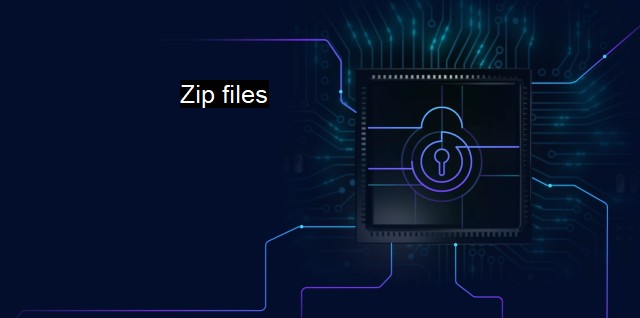What are Zip files?
Unlocking the Power of Zip Files in Cybersecurity: Protecting Data, Enhancing Efficiency, and Combatting Cyber Threats
Zip files have become a ubiquitous part of life in the digital world, adopted by users primarily for their ability to compress large files or folders into a smaller, more convenient size, making them amicable for storage or transfer across different devices or networks. in the context of cybersecurity and antivirus measures, zip files could potentially harbor serious risks which necessitate vigilant scrutiny.Firstly, a precise understanding of what zip files are and how they operate is indispensable. Originating from the ZIP (an acronym for “Zig-zag Inline Package”) file format, zip files employ "lossless" compression. This means that they function as containers that house and compress one or multiple files and folders into a compact file, alongside the added ability to revert the compressed files to their original form without any data loss.
Though the practice of utilizing zip files is routine and largely innocuous, the area of information technology has witnessed an alarming rise in their exploitation as a vehicle for distributing malware. Cybercriminals preload zip files with malware disguised as innocent-looking documents, images, programs, or even other compressed files, whence unsuspecting recipients inadvertently unpack the payload into their systems.
This camouflage offers an innovatively deceitful way to evade antivirus detection. Given the compressed nature of zip files, many conventional antivirus programs struggle to inspect the contents within, thereby enabling a malware-laden zip file to slip through the cyber defenses quilt unnoticed until the recipient subsequently extracts the contents.
Encryption capabilities, another predominant feature of zip files for safeguarding sensitive data, ironically presents an added level of complexity for antivirus applications attempting to vet or scan the zipped content. In many instances, antivirus software may require the decryption of encrypted zip files before they can conduct a scanning sequence. As a result, encrypted malware within zip files could bypass antivirus screening measures, potentially endangering system health and data security.
Cybersecurity firms and antivirus software developers are progressively upgrading their arsenal to confront these threats head-on. Advanced Persistent Threat (APT) detection capabilities, heuristic scanning, and behavior-based detection built into modern antivirus applications add up an additional line of defense in the ongoing cyber warfare.
Noteworthy innovations such as sandboxing techniques undertake the arduous task of unveiling zipped files' content. By running the files in a controlled, insulated environment, these solutions manage to extract information about any potential threats without risking the overall system safety. Similarly, security-aware applications are capable of repackaging decrypted files, thereby ensuring the confidentiality of encrypted data after the scanning process.
In the final analysis, zip files, while being extraordinarily functional and practical for ordinary users, hold a darker undertone in terms of cybersecurity. The risks they pose are severe, yet surrendering to paranoia and stifling innovation is not the solution.
Instead, ambiguating the threats means fostering a broader cognizance about the strengths and weaknesses of zip files, exercising caution in dealing with unknown zip files, and banking on IT industry’s constant pursuit of advanced protection mechanisms against cybercrimes. Proactive, balanced, and informed safety practices can go a long way toward ensuring that zip files remain more of an asset than a liability in the ingenious universe of digital information exchange.

Zip files FAQs
What is a zip file and how does it work in cybersecurity?
A zip file is a compressed archive file that is used to store one or more files or folders in a single file. In cybersecurity, zip files are commonly used to package and transmit multiple files securely. They work by compressing the original files, which reduces the size of the files and makes it easier and quicker to transfer them over the internet or other networks.Are zip files safe in terms of cybersecurity?
Zip files can be both safe and unsafe, depending on their content and the source of the file. If the zip file contains legitimate files and is received from a trusted source, then it is generally considered safe. However, if the zip file contains malicious files, such as malware or viruses, it could pose a significant security risk. As such, it is important to have anti-virus software installed to scan and protect against potentially harmful zip files.Can antivirus detect malware in zip files?
Yes, most antivirus software can detect malware and viruses contained within zip files. Antivirus software typically includes an option to scan compressed files, including zip files, for potential threats. This feature is especially important given the prevalence of zip files in cybersecurity and the potential for them to contain harmful files.How can I protect my computer from zip file-based attacks?
There are several steps you can take to protect your computer from zip file-based attacks. First, ensure that your antivirus software is up-to-date and configured to scan compressed files, including zip files. Second, exercise caution when downloading zip files from unknown or untrusted sources. Third, do not open zip files from suspicious emails, file-sharing networks, or other unverified sources. Finally, regularly back up important files to protect against potential data loss.| | A | | | B | | | C | | | D | | | E | | | F | | | G | | | H | | | I | | | J | | | K | | | L | | | M | |
| | N | | | O | | | P | | | Q | | | R | | | S | | | T | | | U | | | V | | | W | | | X | | | Y | | | Z | |
| | 1 | | | 2 | | | 3 | | | 4 | | | 7 | | | 8 | | |||||||